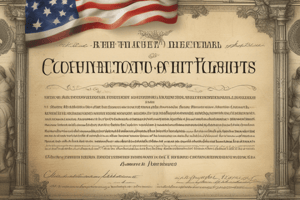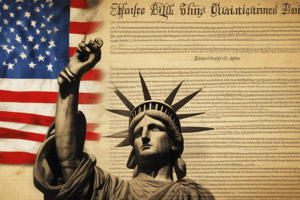Podcast
Questions and Answers
Which freedom is NOT protected by the First Amendment?
Which freedom is NOT protected by the First Amendment?
- Freedom of Assembly
- Freedom of Religion
- Freedom to Bear Arms (correct)
- Freedom of Speech
What does the Second Amendment guarantee?
What does the Second Amendment guarantee?
- The right to a fair trial
- The right to assemble peacefully
- The right to freedom of speech
- The right to bear arms (correct)
Which amendment addresses the quartering of soldiers?
Which amendment addresses the quartering of soldiers?
- Amendment 3 (correct)
- Amendment 5
- Amendment 2
- Amendment 4
What must the government obtain before conducting a search of a person's property?
What must the government obtain before conducting a search of a person's property?
Which right is protected under the Fifth Amendment?
Which right is protected under the Fifth Amendment?
What is guaranteed by the Sixth Amendment?
What is guaranteed by the Sixth Amendment?
Which amendment assures the right to a jury trial in civil cases?
Which amendment assures the right to a jury trial in civil cases?
What does the Eighth Amendment prohibit?
What does the Eighth Amendment prohibit?
The Ninth Amendment acknowledges which concept?
The Ninth Amendment acknowledges which concept?
Which amendment protects the press from government censorship?
Which amendment protects the press from government censorship?
What is the primary purpose of the Bill of Rights?
What is the primary purpose of the Bill of Rights?
What does Amendment 3 pertain to?
What does Amendment 3 pertain to?
Which right is explicitly mentioned in the First Amendment?
Which right is explicitly mentioned in the First Amendment?
What does Amendment 4 protect against?
What does Amendment 4 protect against?
Which amendment addresses the rights of individuals in civil cases?
Which amendment addresses the rights of individuals in civil cases?
What concept is recognized by the Ninth Amendment?
What concept is recognized by the Ninth Amendment?
What does Amendment 10 state about federal powers?
What does Amendment 10 state about federal powers?
Flashcards
Bill of Rights
Bill of Rights
The first 10 amendments to the US Constitution, guaranteeing essential freedoms and rights to citizens.
Freedom of Religion
Freedom of Religion
The right to practice any religion, or no religion at all.
Freedom of Speech
Freedom of Speech
The right to express ideas and opinions freely, even if controversial.
Freedom of the Press
Freedom of the Press
Signup and view all the flashcards
Freedom of Assembly
Freedom of Assembly
Signup and view all the flashcards
Freedom to Petition
Freedom to Petition
Signup and view all the flashcards
Right to Bear Arms
Right to Bear Arms
Signup and view all the flashcards
Quartering of Soldiers
Quartering of Soldiers
Signup and view all the flashcards
Search and Seizure
Search and Seizure
Signup and view all the flashcards
Due Process of Law
Due Process of Law
Signup and view all the flashcards
Double Jeopardy
Double Jeopardy
Signup and view all the flashcards
Self-Incrimination
Self-Incrimination
Signup and view all the flashcards
Speedy and Public Trial
Speedy and Public Trial
Signup and view all the flashcards
Right To A Lawyer
Right To A Lawyer
Signup and view all the flashcards
Jury Trial in Civil Cases
Jury Trial in Civil Cases
Signup and view all the flashcards
Cruel and Unusual Punishment
Cruel and Unusual Punishment
Signup and view all the flashcards
Unenumerated Rights
Unenumerated Rights
Signup and view all the flashcards
Amendment 1
Amendment 1
Signup and view all the flashcards
Amendment 2
Amendment 2
Signup and view all the flashcards
Amendment 3
Amendment 3
Signup and view all the flashcards
Amendment 4
Amendment 4
Signup and view all the flashcards
Amendment 5
Amendment 5
Signup and view all the flashcards
Amendment 6
Amendment 6
Signup and view all the flashcards
Amendment 7
Amendment 7
Signup and view all the flashcards
Amendment 8
Amendment 8
Signup and view all the flashcards
Amendment 9
Amendment 9
Signup and view all the flashcards
Amendment 10
Amendment 10
Signup and view all the flashcards
Study Notes
The Bill of Rights
- The first 10 amendments to the US Constitution are known as the Bill of Rights.
- They guarantee essential freedoms and rights to the citizens.
Amendment 1: Freedoms
- Freedom of Religion: Individuals are free to practice any religion or no religion at all.
- Freedom of Speech: Citizens have the right to express their ideas and opinions freely, even if those opinions are controversial.
- Freedom of the Press: The media (newspapers, television, etc.) can publish information without government censorship.
- Freedom of Assembly: People can gather peacefully to protest or express their views.
- Freedom to Petition: Citizens can ask the government to change laws or policies.
Amendment 2: The Right to Bear Arms
- This amendment guarantees the right of individuals to own guns.
- It's a controversial amendment, often debated in the context of gun control laws.
Amendment 3: Quartering of Soldiers
- The government cannot force citizens to house soldiers in their homes.
Amendment 4: Search and Seizure
- The government needs a warrant (written permission from a judge) before searching a person's home or property.
- This protects privacy and prevents unreasonable searches.
Amendment 5: Rights of the Accused
- This amendment establishes several important rights for people accused of crimes, including:
- Due Process of Law: The government must follow fair procedures in legal proceedings. This protects individuals from arbitrary or unfair treatment.
- Double Jeopardy: A person cannot be tried twice for the same crime.
- Self-Incrimination: A person has the right to remain silent and not testify against themselves in a criminal case.
Amendment 6: Rights to a Fair Trial
- This amendment guarantees the right to a speedy and public trial by an impartial jury.
- It also guarantees the right to a lawyer for those who cannot afford one.
Amendment 7: Right to a Jury Trial in Civil Cases
- This amendment guarantees the right to a jury trial in civil cases (disputes between individuals or companies).
Amendment 8: Cruel and Unusual Punishment
- This amendment prohibits the government from inflicting cruel and unusual punishment on those convicted of crimes.
Amendment 9: Unenumerated Rights
- This amendment acknowledges that there are other rights not specifically listed in the Constitution, and these rights belong to the people. Example: Right to privacy!
Amendment 10: Reserved Powers
- Powers not given to the federal government, nor withheld from the states, are reserved for the states or the people. This is a fundamental principle of federalism, where power is shared between the national government and the states.
Studying That Suits You
Use AI to generate personalized quizzes and flashcards to suit your learning preferences.




